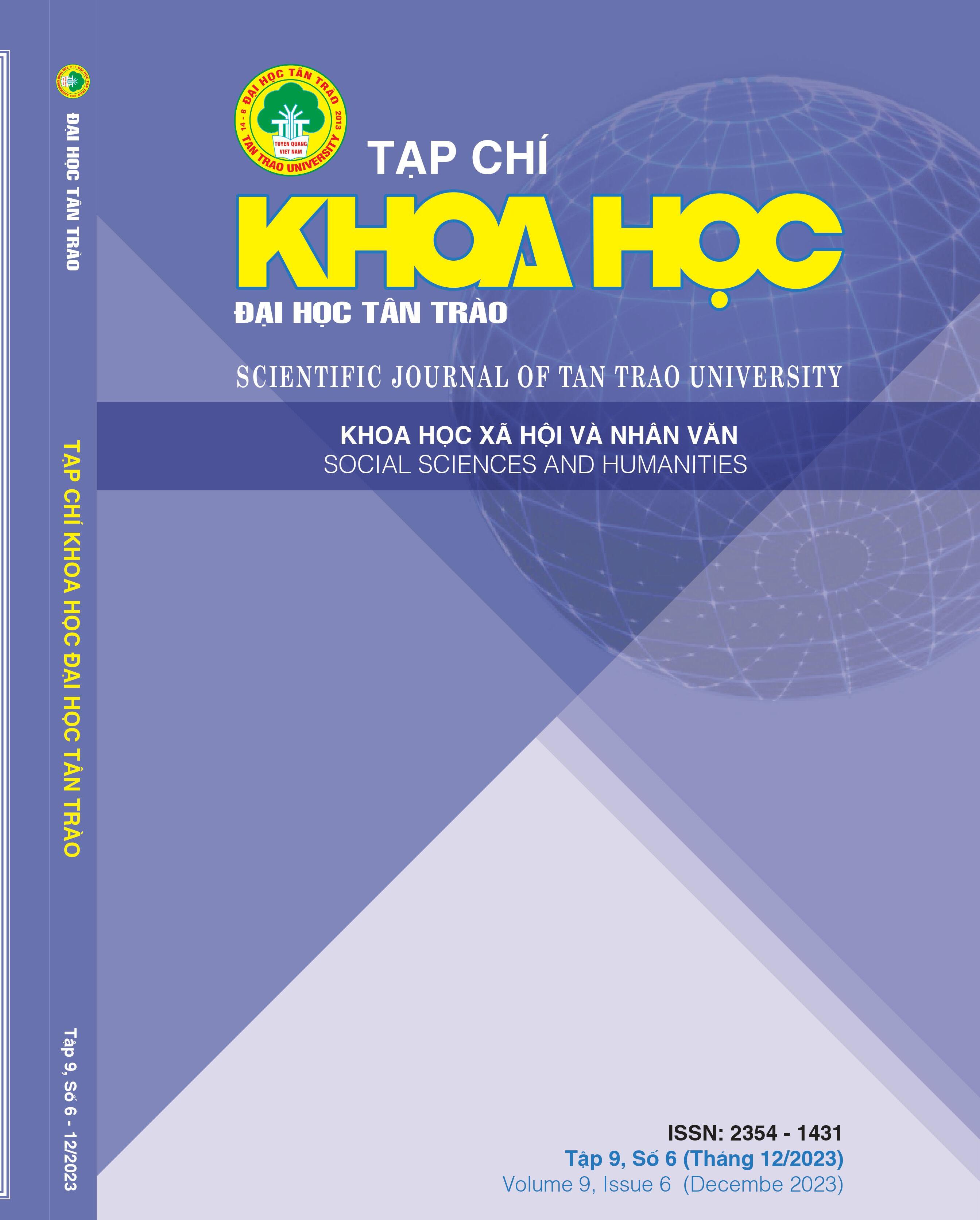NÂNG CAO VỐN TỪ VỰNG CHO SINH VIÊN TIẾNG ANH KHÔNG CHUYÊN QUA BẢN TIN TIẾNG ANH TRÊN BBC
DOI:
https://doi.org/10.51453/2354-1431/2023/1141Từ khóa:
Từ vựng tiếng Anh, chuyên ngành tiếng Anh, Tin tức tiếng Anh của BBC, Kỹ năng nghe, Từ mớiTóm tắt
Với mục tiêu tìm hiểu tác động của việc nghe tin tức tiếng Anh trên chương trình BBC đến việc học tiếng Anh như một ngoại ngữ tại một cơ sở giáo dục đại học ở Miền Trung Việt Nam. Đã có 79 sinh viên sẵn sàng tham gia vào nghiên cứu, trong đó, 39 người được đưa vào nhóm thử nghiệm và 40 sinh viên còn lại được đưa vào nhóm đối chứng. Sau khi cả hai nhóm phải hoàn thành bài kiểm tra trước khi thực nghiệm (pre-test), trong 8 tuần nhóm thực nghiệm nghe Bản tin tiếng Anh trên kênh BBC để nâng cao vốn từ vựng đông thời hoàn thành bài tập cloze-test được thiết kế trên lời thoại và hoàn thành bài post-test để kiểm tra hiệu quả tác động từ thực nghiệm. Kết quả phân tích từ SPSS cho thấy, so với nhóm đối chứng, mức tăng trưởng vốn từ vựng của nhóm thực nghiệm cao hơn đáng kể. Điều này chứng tỏ vốn từ vựng của người học chuyên ngành tiếng Anh được nâng cao nếu nghe tin tức tiếng Anh trên kênh BBC thường xuyên.
Tải xuống
Tài liệu tham khảo
[1] Decarrico, J. S. (2001). “Vocabulary Learning and Teaching”.Celce-Murcia, M. (ed.). Teaching English as a Second or Foreign Language, pp. 285-299. Boston: Heinle&Heinle.
[2] Jordan, R. R. (1997). English for Academic Purposes.A Guide and Resource for Teachers. Cambridge: Cambridge University Press.
[3] Krashen, S. D. (1982). Principles and Practice in Second Language Acquisition. Pergamon Press Ltd.
[4] Krashen, S. (1985).The Input Hypothesis: Issues and implication. London and New York: Longman.
[5] Kilickaya, F. (2004). “Authentic Materials and Culture Content in EFL Classrooms,” The Internet ELT Journal, vol. 10, no. 7.
[6] Martinez, A.G. (2002). “Authentic Materials: An Overview,” Free Resources of Teachers and Students of English, Karen's Linguistic Issues, pp. 1-7.
[7] Nation, I.S.P. (2001). Learning vocabulary in another language. Cambridge: Cambridge University Press.
[8] Peacock, M. (1997). “The Effect of Authentic Materials on the Motivation of EFL Learners, “ ELT Journal, vol. 51, no. 2, pp. 144-156.
[9] Quirk, R., & Widdowson, H. G. (1985). ENGLISH IN THE WORLD: TEACHING AND LEARNING THE LANGUAGE AND LITERATURES. Cambridge: Cambridge University Press, Pp. xi + 275.
[10] Rogers, C.V. (1988). “Language with a purpose: Using authentic materials in the foreign language classroom,” Foreign Language Annals, vol. 2, no. 5, pp. 467-476.
[11] Schmitt, N. (2008). “Review article: Instructed second language vocabulary learning,” Language Teaching Research, vol. 12, pp. 329-363, Jul.
[12] Wallace, C. (1992). Reading. Oxford: Oxford University Press.
[13] Wilkins, D.A. (1972). Linguistics in Language Teaching. Cambridge: MFT Press.
[14] Tran, Y. (2023). Improving english vocabulary for students through listening to english news. International Journal of Language and Literary Studies, 5(1), 1–13. Retrieved from https://ijlls.or g/index.php/ijlls/article/view/1152
[15] Zhang, B. (2009). “FL Vocabulary Learning of Undergraduate English Majors in Western China: Perspective, Strategy Use and Vocabulary Size,” English Language Teaching, vol. 2, no. 3.
Tải xuống
Đã Xuất bản
Cách trích dẫn
Số
Chuyên mục
Giấy phép

Tác phẩm này được cấp phép theo Giấy phép Quốc tế Creative Commons Attribution-ShareAlike 4.0 .
Bài báo được xuất bản ở Tạp chí Khoa học Đại học Tân Trào được cấp phép theo giấy phép Ghi công - Chia sẻ tương tự 4.0 Quốc tế (CC BY-SA). Theo đó, các tác giả khác có thể sao chép, chuyển đổi hay phân phối lại các bài báo này với mục đích hợp pháp trên mọi phương tiện, với điều kiện họ trích dẫn tác giả, Tạp chí Khoa học Đại học Tân Trào và đường link đến bản quyền; nêu rõ các thay đổi đã thực hiện và các nghiên cứu đăng lại được tiến hành theo cùng một bản quyền.
Bản quyền bài báo thuộc về các tác giả, không hạn chế số lượng. Tạp chí Khoa học Tân Trào được cấp giấy phép không độc quyền để xuất bản bài báo với tư cách nhà xuất bản nguồn, kèm theo quyền thương mại để in các bài báo cung cấp cho các thư viện và cá nhân.
Mặc dù các điều khoản của giấy phép CC BY-SA không dành cho các tác giả (với tư cách là người giữ bản quyền của bài báo, họ không bị hạn chế về quyền hạn), khi gửi bài tới Tạp chí Khoa học Đại học Tân Trào, tác giả cần đáp ứng quyền của độc giả, và cần cấp quyền cho bên thứ 3 sử dụng bài báo của họ trong phạm vi của giấy phép.






